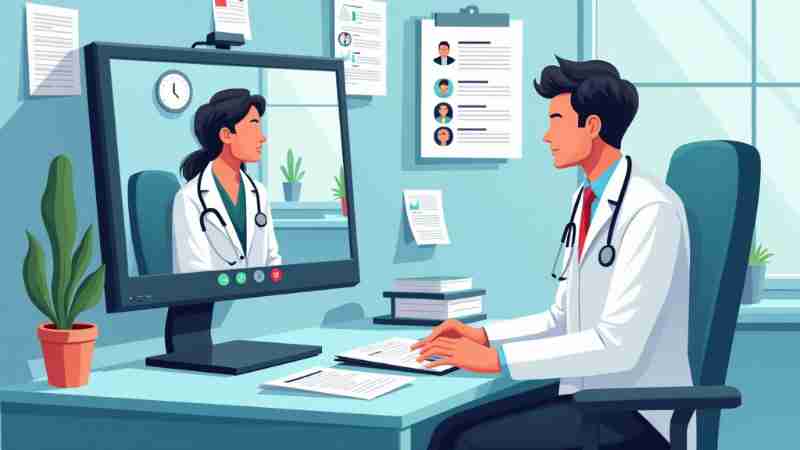Virtual second opinion (VSO) programs have transformed healthcare by giving patients access to expert medical evaluations without needing to travel. These services are particularly beneficial for those in rural or underserved areas who lack access to specialized care. However, while VSOs provide clinical advantages, they also raise complex legal and regulatory issues, particularly concerning medical licensure and the practice of medicine.
As telehealth continues to expand, physicians, healthcare organizations, and insurers must navigate a patchwork of state laws and evolving regulations to ensure compliance. Failure to do so can result in legal repercussions, financial penalties, and reputational damage.
Key Takeaways
Virtual second opinions (VSO) in telehealth offer significant benefits but also pose complex legal and regulatory challenges related to medical licensure.
- Most states consider VSOs as practicing medicine, requiring physicians to be licensed in the patient’s state.
- Providers can use peer-to-peer consultation exemptions to comply with regulations, but deviations may lead to penalties.
- Healthcare organizations face financial risks if they reimburse for unlicensed VSO services and could lose public trust.
Legal classification of virtual second opinions
VSO programs operate by allowing patients to seek evaluations from medical specialists who review their medical history and provide treatment recommendations. However, a major legal debate centers on whether these services constitute the practice of medicine or are merely educational.
Educational vs. medical opinions
Some argue that VSOs are purely informational, meaning that doctors providing them are not technically engaging in medical practice. If this were true, physicians could offer second opinions nationwide without needing to obtain multiple state licenses. However, this interpretation is largely unsupported by law.
Most states define the practice of medicine as assessing a specific patient’s medical condition, offering a diagnosis, and recommending treatment. By this standard, the vast majority of VSOs qualify as medical services, requiring the physician to be licensed in the state where the patient resides. The few existing exemptions for educational services typically apply only to demonstrations for students or academic discussions, not direct patient care.
The peer-to-peer consultation exemption
One legal workaround for VSOs is the peer-to-peer consultation exemption. This allows an out-of-state specialist to provide a second opinion when consulting with a local treating physician. Nearly every state has some version of this exemption, but the specifics vary. If VSO providers structure their services to comply with this exemption, they may be able to operate without obtaining separate state licenses. However, any deviation from the exemption’s guidelines could lead to accusations of unauthorized medical practice.
Regulatory challenges and compliance risks
During the COVID-19 pandemic, many states temporarily waived medical licensure restrictions, allowing doctors to provide remote care across state lines. These waivers have since expired, leading to renewed scrutiny of telehealth services, including VSOs.
Unlicensed medical practice risks: Doctors delivering VSOs without proper licensure face serious legal consequences. In most states, practicing medicine without a license is a criminal offense. If found guilty, physicians may face disciplinary action, malpractice insurance denials, and reciprocal penalties in all states where they hold medical licenses.
A landmark case, Smith v. Laboratory Corporation of America (2010), established that a doctor providing a diagnosis for an out-of-state patient without meeting licensure exemptions had unlawfully practiced medicine. This case serves as a warning for VSO providers operating without proper authorization.
Health plans and financial liability: Healthcare organizations and insurers also face financial risks related to VSOs. Health plans that reimburse for unlicensed VSO services may be subject to overpayment demands, financial recoupments, or even False Claims Act violations. If a VSO program does not comply with state regulations, insurers could face legal action for funding unauthorized medical services.
Reputational and ethical considerations: Beyond legal and financial risks, noncompliance can lead to reputational damage for doctors and healthcare organizations. Patients expect high-quality, legally compliant medical advice from licensed professionals. If a VSO program is found to be operating outside legal boundaries, it may lose public trust, which can have long-term consequences for its viability.
Future of virtual second opinion regulations
Telehealth regulations continue to evolve, with ongoing discussions about national licensure reciprocity. Some stakeholders advocate for a single federal license allowing doctors to practice nationwide, eliminating the need for state-by-state compliance. However, until such measures are implemented, providers must work within existing state regulations.
Recent policy developments
Recent Congressional actions have extended some telehealth flexibilities under Medicare, but these laws do not override state licensure requirements. Some states are considering updates to their medical licensing laws to accommodate telehealth expansion, but no universal framework has been established.
VSO providers must verify licensure requirements in each state to avoid regulatory violations. Medical licensing laws vary, so physicians must be properly credentialed where the patient is located. Aligning VSO services with legal exemptions, like peer-to-peer consultations, helps maintain compliance. These exemptions allow specialists to give second opinions through local physicians, but requirements vary by state.
Staying updated on state and federal telehealth regulations is essential. Laws change frequently, and noncompliance can lead to legal issues. Legal experts can help VSO providers navigate complex telehealth laws. Proper structuring reduces the risk of penalties, disputes, and reputational damage.
While VSOs provide significant benefits by improving patient access to specialized medical expertise, they also introduce complex legal challenges. Providers must carefully navigate state licensure laws, avoid unlicensed medical practice, and ensure regulatory compliance to protect themselves and their patients. As telehealth continues to grow, staying informed about policy changes will be crucial for the sustainable operation of virtual second opinion programs.






